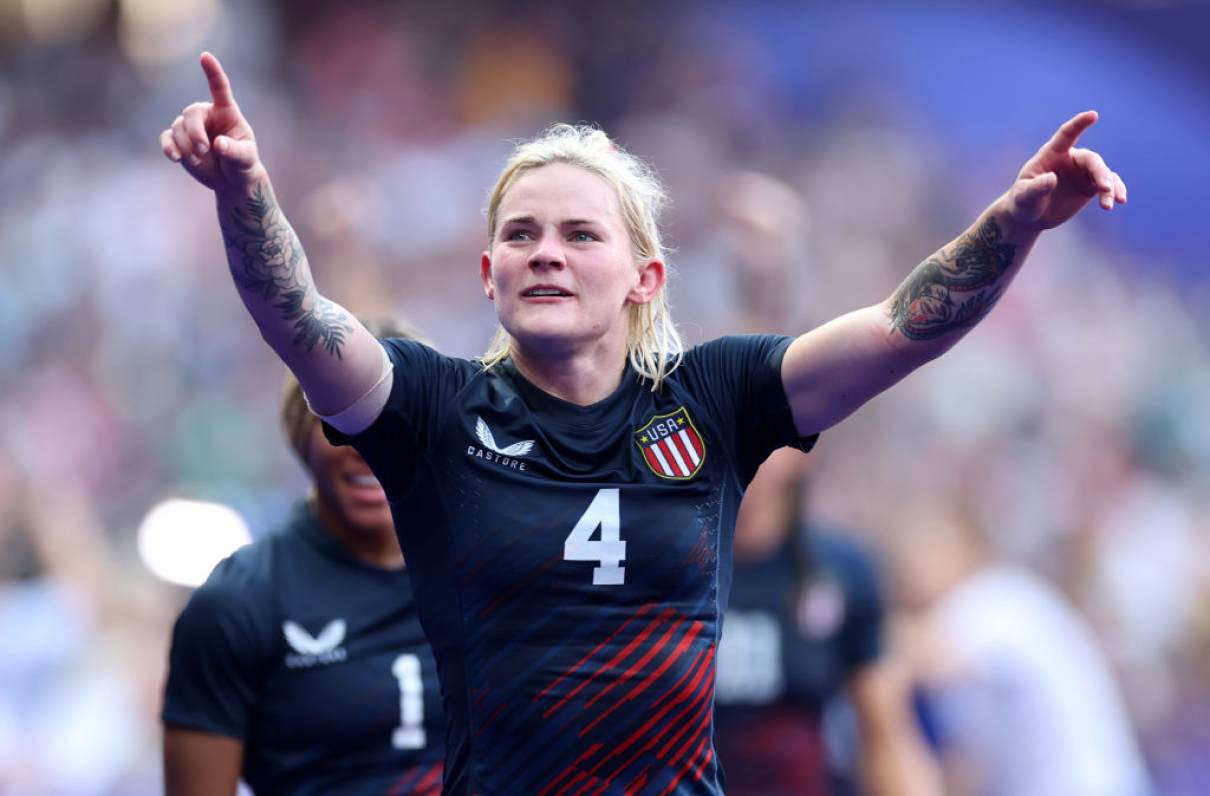This article by Matt Wagner originally appeared on Stripes.com. Stars and Stripes serves the U.S. military community by providing editorially independent news and information around the world.
SAINT-DENIS, France — Late in the Olympic bronze-medal match against Australia on Tuesday evening, the United States women’s rugby sevens team needed a miracle.
U.S. Army Capt. Sammy Sullivan and the Eagles trailed the Australians by five with just seconds remaining at Stade de France and needed to go the length of the field.
That miracle came in the form of substitute Spiff Sedrick.
The 5-foot-3, 137-pound Sedrick broke a lunging tackle attempt by Australia’s Sharni Smale and then ran into the waiting arms of Teagan Levi. The American powered through the 5-foot-8, 146-pound Australian and looked ahead.
Suddenly, the entire field was her playground, not an opponent in sight.
Sedrick blitzed down the middle and outlasted a late charge by an Australian defender to score the try in second-half stoppage time. Then, the 26-year-old, who admitted she had shanked two attempts in warmups, kicked the conversion to clinch the bronze medal with the last touch of the match.
The U.S. shocked the No. 2 team in the world 14-12.
[RELATED: Small Military Contingent Seeks Golden Impact for Team USA in Paris]
“Australia has really clinical defense and attack, so I was actually pretty surprised to get the break on,” Sedrick said. “I know any time I get the break on against Australia, all of them are going to be chasing back.”
“To be honest, I thought we had won when I scored, and then I realized it was tied,” the former volleyball player added. “I’m not the team’s dedicated kicker. I’m not the second, third or fourth in line for that position, but I was the one on the field to take it and, luckily, it went in.”
It was the first medal for either the American men’s or women’s rugby sevens program since the sport’s introduction to the Games at the 2016 Rio Olympics.
Tuesday’s win also was the first medal for any U.S. rugby team since the men’s rugby union program won back-to-back golds in 1920 and 1924. That 1924 squad was victorious in Paris.
The sport — either in the 15s or sevens version — wasn’t a part of the Olympic program from 1928 to 2012.
[RELATED: How Servicemembers, Veterans Can Watch Olympic Games Coverage for Free]
“It’s a dream come true, just like every other moment of this whole tournament has been,” said Sullivan, who came off for a substitute minutes before Sedrick’s heroics and celebrated with her teammates on the sideline. “It’s surreal.”
It was a close match throughout. The U.S. answered an early score by Australia’s Maddison Levi to tie with a try and conversion by Alev Kelter.
The Australians continually knocked on the door as they pinned the Americans inside their defensive half for most of the second half. Eventually, Australia took the lead when Maddison Levi got a pass from sister Teagan Levi to make it 12-7 in the 13th minute.
U.S. coach Emilie Bydwell said tight and high-level matches are typical for rugby sevens.
“It comes down to the wire, especially in pinnacle events like this,” Bydwell said. “It’s this exciting all the time, whether it’s a quarterfinal, a semifinal, a bronze medal final.”
The U.S. ended up in the bronze-medal match after losing to New Zealand in the semifinal 24-12 earlier in the day. The Eagles jumped out to an early 5-0 lead thanks to a try by Kelter, who cut through a pair of New Zealand players for a try.
The Black Ferns Sevens took control after that. They jumped out to a 19-point lead in the 12th minute before Kristi Kirshe added a consolation try in second-half stoppage time.
Sullivan said the team felt it missed out on a chance to play in the gold-medal game, but the players also understand the impact the bronze will have on the game back home.
This could be a watershed moment, she said. “This medal is going to grow the game immensely,” Sullivan said. “I mean, Lo’s (teammate Ilona Maher) following blew up to like 2 million, and I think all those young girls and women watching us achieve this are going to start playing rugby.
“This is the match that’s going to catch rugby for women in the U.S. on fire.”
See the World (and Save!) With MOAA Vacations
Book your next big trip, or check out an upcoming MOAA Signature Cruise today!
